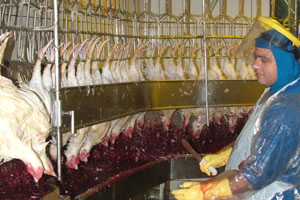Denmark bans ritual halal poultry killings

The Danish government has approved a measure forbidding poultry and livestock to be killed without being pre-stunned, prompting outrage from Jewish and Muslim groups.
According to their customs, animals must be conscious when killed to be considered kosher (Jewish) or halal (Muslim).
Denmark is the latest European country to approve such a ban: Norway, Sweden and Switzerland passed laws forbidding ritual slaughter decades ago, and the Poles approved a ban in 2012. The Dutch Senate rejected a bill by the Party for the Animals, while the British have refused to introduce such a bill in spite of intense lobbying by animal rights groups.
Danish officials said the country has long had restrictive rules concerning the ritual slaughter of animals. Until now, all animals had to be stunned, but an exception allowed animals to be stunned after the slaughter and that exception has now been removed.
Jewish and Muslim groups say the latest moves effectively disenfranchise their time-honored religious traditions.
Even though the European Union requires pre-stunning the bloc’s rules allow for exemptions on religious grounds and that is what the Danish groups are asking for.
The decision by Denmark’s government is also expected to affect the multi-million dollar trade from Gulf states. Danish exports of halal beef and poultry products are imported in massive quantities by Gulf countries. The Saudi government has already called for the ban to be lifted.
Source: Washington Post












